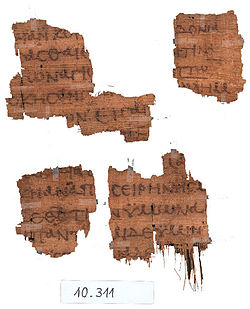| Romans 15 | |
|---|---|
 Epistle to the Romans 15:26–27, 32–33 in Papyrus 118, written in the 3rd century | |
| Book | Epistle to the Romans |
| Category | Pauline epistles |
| Christian Bible part | New Testament |
| Order in the Christian part | 6 |
Romans 15 is the fifteenth chapter of the Epistle to the Romans in the New Testament of the Christian Bible. It is authored by Paul the Apostle, while he was in Corinth in the mid-50s AD, [1] with the help of an amanuensis (secretary), Tertius, who adds his own greeting in Romans 16:22. [2]
Contents
- Text
- Textual witnesses
- Old Testament references
- New Testament references
- Theme
- The scriptures
- Verses 3-4
- The gentiles
- Verse 9
- Verse 12
- Illyricum
- See also
- References
- Bibliography
- External links
According to Martin Luther,
In chapter 15, St. Paul cites Christ as an example to show that we must also have patience with the weak, even those who fail by sinning publicly or by their disgusting morals. We must not cast them aside but must bear with them until they become better. That is the way Christ treated us and still treats us every day; he puts up with our vices, our wicked morals and all our imperfection, and he helps us ceaselessly. Finally Paul prays for the Christians at Rome; he praises them and commends them to God. He points out his own office and the message that he preaches. He makes an unobtrusive plea for a contribution for the poor in Jerusalem. Unalloyed love is the basis of all he says and does. [3]
